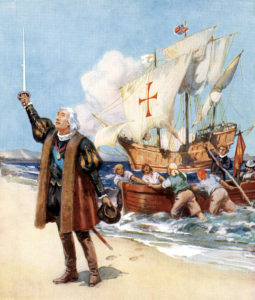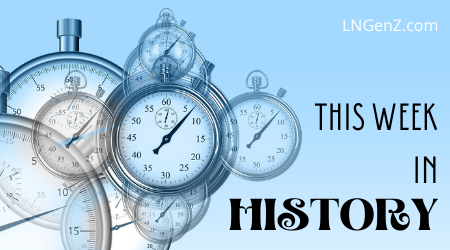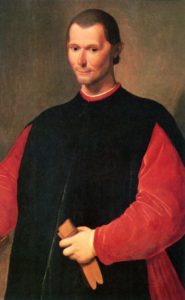-
January
-
February
- This Week in History: February 6-12 – Lesson
- This Week in History: February 6-12 – Quiz
- This Week in History: February 13-19 – Lesson
- This Week in History: February 13-19 – Quiz
- This Week in History: February 20-26 – Lesson
- This Week in History: February 20-26 – Quiz
- This Week in History: February 27-March 5 – Lesson
- This Week in History: February 27-March 5 – Quiz
-
March
- This Week in History: March 6-12 – Lesson
- This Week in History: March 6-12 – Quiz
- This Week in History: March 13-19 – Lesson
- This Week in History: March 13-19 – Quiz
- This Week in History: March 20-26 – Lesson
- This Week in History: March 20-26 – Quiz
- This Week in History: March 27-April 2 – Lesson
- This Week in History: March 27-April 2 – Quiz
-
April
- This Week in History April 3-9 – Lesson
- This Week in History April 3-9 – Quiz
- This Week in History: April 10-16 – Lesson
- This Week in History: April 10-16 – Quiz
- This Week in History: April 17-23 – Lesson
- This Week in History: April 17-23 – Quiz
- This Week in History: April 24-30 – Lesson
- This Week in History: April 24-30 – Quiz
-
May
- This Week in History: May 1 – 7 – Lesson
- This Week in History: May 1 – 7 – Quiz
- This Week in History: May 8 – 14 – Lesson
- This Week in History: May 8 – 14 – Quiz
- This Week in History: May 15 – 21 – Lesson
- This Week in History: May 15 – 21 – Quiz
- This Week in History: May 22-28 – Lesson
- This Week in History: May 22-28 – Quiz
- This Week in History: May 29-June 4 – Lesson
- This Week in History: May 29-June 4 – Quiz
-
June
- This Week in History: June 5 – 11 – Lesson
- This Week in History: June 5 – 11 – Quiz
- This Week in History: June 12-18 – Lesson
- This Week in History: June 12-18 – Quiz
- This Week in History: June 19-25 – Lesson
- This Week in History: June 19-25 – Quiz
- This Week in History: June 26 – July 2 – Lesson
- This Week in History: June 26 – July 2 – Quiz
-
July
- This Week in History: July 3 – 9 – Lesson
- This Week in History: July 3 – 9 – Quiz
- This Week in History: July 10 – 16 – Lesson
- This Week in History: July 10 – 16 – Quiz
- This Week in History July 17 – 23 – Lesson
- This Week in History July 17 – 23 – Quiz
- This Week in History – July 24-30 – Lesson
- This Week in History – July 24-30 – Quiz
- This Week in History: July 31 – August 6 – Lesson
- This Week in History: July 31 – August 6 – Quiz
-
August
- This Week in History: August 7-13 – Lesson
- This Week in History: August 7-13 – Quiz
- This Week in History: August 14 – 20 – Lesson
- This Week in History: August 14 – 20 – Quiz
- This Week in History: August 21 – 27 – Lesson
- This Week in History: August 21 – 27 – Quiz
- This Week in History: August 28 – September 3 – Lesson
- This Week in History: August 28 – September 3 – Quiz
-
September
- This Week in History: September 4 – 10 – Lesson
- This Week in History: September 4 – 10 – Quiz
- This Week in History: September 11 -17 – Lesson
- This Week in History: September 11 -17 – Quiz
- This Week in History: September 18 – 24 – Lesson
- This Week in History: September 18 – 24 – Quiz
- This Week in History: September 25 – October 1 – Lesson
- This Week in History: September 25 – October 1 – Quiz
-
October
- This Week in History: October 2-8 – Lesson
- This Week in History: October 2-8 – Quiz
- This Week in History: October 9 –15 – Lesson
- This Week in History: October 9 –15 – Quiz
- This Week in History: October 16–22 – Lesson
- This Week in History: October 16–22 – Quiz
- This Week in History: October 23–29 – Lesson
- This Week in History: October 23 –29 – Quiz
- This Week in History: October 30 – November 5 – Lesson
- This Week in History: October 30 – November 5 – Quiz
-
November
- This Week in History: November 6 – 12 – Lesson
- This Week in History: November 6 – 12 – Quiz
- This Week in History: November 13 – 19 – Lesson
- This Week in History: November 13 – 19 – Quiz
- This Week in History: November 20 – 26 – Lesson
- This Week in History: November 20 – 26 – Quiz
- This Week in History: November 27- December 3 – Lesson
- This Week in History: November 27- December 3 – Quiz
-
December
This Week in History: May 1 – 7 – Lesson

Christopher Columbus (Photo by Ann Ronan Pictures/Print Collector/Getty Images)
Christopher Columbus discovered Jamaica and the start of the Vietnam War.
History is formed by the people, those who have power and those without power. Each one of us makes history.” ~ Anselm Kiefer
May 4, 1494: Christopher Columbus Discovered Jamaica
Most people associate Christopher Columbus as being the first European to discover America – although that was by accident. However, he is also credited with finding Jamaica. On this day, during his second voyage, Columbus sighted the island. He claimed it for Spain, as he had America.
The natives of the land were called the Taíno, and they had named the island “Xaymaca,” which the Spanish changed to “Jamaiqua,” and then, later, to the Jamaica we know today. At first, Columbus did little with the area. But on his fourth voyage, he had been sailing for a year around the Caribbean when a storm hit, and his ship ended up beached on St. Ann’s Bay on June 25, 1503. He and his men were stranded there for a year.
Columbus set up plantations, and the island was used mainly as a place to store supplies to support his travels. Even though the Spanish Crown granted Jamaica to the Columbus family, it was decades before it was used for more than storage. In 1508, Juan de Esquivel founded a permanent European settlement.
May 7, 1954: The French Indochina War Ended
In the late 1940s, Vietnam, Cambodia, and Laos were colonies held by the French – barely. Even though the United States offered financial assistance, the French could not hold the area, known as Indochina. On May 7, 1954, France withdrew its troops from the city of Dien Bien Phu in Vietnam. Vietnamese nationalist Ho Chi Minh had led a four-month siege on the French and finally won.
French Indochina was dissolved. Vietnam was divided into two parts: North Vietnam and South Vietnam. North Vietnam became a communist state, run by Ho Chi Minh and supported by the Soviet Union.
President Dwight D. Eisenhower was concerned with France’s loss. He thought that if one country fell to communism, then the rest of the world would, too. An agreement was reached where Ho Chi Minh’s forces would control the north part of the country while the French would remain in the south. The US also supported in the southern section, or South Vietnam, and would remain there for another 20 years during the Vietnam War.
Other Notable Mentions
May 1: May Day. This is a holiday that celebrates spring with a festival popular since ancient times. It is also known as a worker’s holiday.
May 1, 1707: England and Scotland formed a union that became Great Britain.
May 1, 1960: An American spy plane was shot down in Russia while President Dwight D. Eisenhower and Russia’s Premier Nikita Khrushchev were meeting during a summit.
 May 1, 2004: The largest expansion to the European Union (EU) happened when eight former Communist nations as well as two Mediterranean countries joined the EU, including Poland, Hungary, and the Czech Republic.
May 1, 2004: The largest expansion to the European Union (EU) happened when eight former Communist nations as well as two Mediterranean countries joined the EU, including Poland, Hungary, and the Czech Republic.
May 4, 1886: The Haymarket Square Riot happened in Chicago. During speeches by labor activists, a bomb was thrown, and police officers advanced on 1,300 people who were listening to the speakers.
May 4, 1970: Four students were killed at Kent State University when National Guardsmen opened fire on a crowd protesting President Richard Nixon’s decision to invade Cambodia. Protests resulted in 450 colleges and universities closing temporarily.
May 5: Cinco de Mayo. In Mexico, this is a national holiday to remember the Battle of Puebla in 1862.
May 5, 1856: The first time the US celebrated Decoration Day. On this day, people decorated Civil War soldiers’ graves with flowers. The date was later moved to May 30, and then became known as Memorial Day.
May 5, 1893: The Wall Street Crash caused 600 banks to close and 15,000 businesses to bankrupt.
May 5, 1961: Alan Shepard became the first American in space. He flew the Freedom 7.
May 6, 1937: The airship Hindenburg burst into flames at Lakehurst, New Jersey, after a trans-Atlantic voyage.
May 7, 1915: A German submarine sank the British passenger ship Lusitania off the coast of Ireland. Of its 1,924 passengers, 1,198 were killed, including 114 Americans.
May 7, 1945: General Alfred Jodl signed an unconditional surrender of German forces, ending World War II in Europe.
May 7, 1992: The 27th Amendment to the US Constitution was ratified. This prohibited Congress from giving itself pay raises.
Famous Birthdays

Niccol˜ di Bernardo dei Machiavelli (Photo by: Pictures From History/Universal Images Group via Getty Images)
Mary “Mother” Jones (May 1, 1830) was born in County Cork, Ireland. She lost her husband and children in 1867 during a yellow fever epidemic, then her belongings in 1871 during the Chicago Fire. She worked for labor rights using the slogan, “Join the Union, boys” and gave her last speech on her 100th birthday.
Niccolò Machiavelli (May 3, 1469) was born in Florence, Italy. He was a writer and political thinker with works such as Discourses on Livy and The Prince.
Golda Meir (May 3, 1898) was born in Kiev, Russia. She was a founder of the modern state of Israel and served as prime minister from 1969 to 1974.
Karl Marx (May 5, 1818) was born in Treves, Germany. His name is where we get the term Marxism. He is considered the founder of communism and co-authored works such as Das Kaptial and The Communist Manifesto.
Nellie Bly (May 5, 1867) was born in Cochran’s Mills, Pennsylvania. She was a human rights advocate who pretended to be an inmate in an insane asylum to show how badly the patients were treated. She is known for her tour around the world in 72 days during 1889-90.
Sigmund Freud (May 6, 1856) was born in Freiberg, Moravia. His theories became the foundation for treating people with psychiatric disorders.
Robert E. Peary (May 6, 1856) was born in Cresson, Pennsylvania. An explorer, he led an expedition beginning on April 6, 1909, to reach the North Pole. He also proved Greenland is an island.
Johannes Brahms (May 7, 1833) was born in Hamburg, Germany. He composed more than 300 songs, including German Requiem, which was in honor of the death of his mother.
Archibald MacLeish (May 7, 1892) was born in Glencoe, Illinois. He won the Pulitzer Prize three times and was also an editor, playwright, farmer, lawyer, professor, and the librarian of Congress.